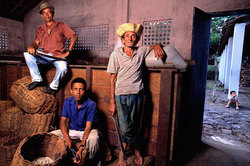Mondaq | 10 August 2011

by Lays Marques Bizarria
Brazilian Government recognizes the importance of foreign investment in the form of rural land ownership
In an attempt to attract foreign capital into the agricultural sector, but still maintain control of the amount of land held by overseas interests, the Government is considering establishing a new administrative path towards the granting of land sale to foreigners.
Since the tight restrictions introduced in August last year to control the purchase of Brazilian rural land property by overseas individuals or companies, studies suggest that Brazil has lost between R$ 15 billion and R$ 25 billion in overseas investment in the agricultural sector.1
Until recently, the Brazilian Ministry of Agriculture, Cattle Breeding and Food Provision (Mapa) has towed the Government line and remained adamant that foreign investment in Brazilian rural land should remain non-existent.
However, recognizing the need to balance the need for FDI (Foreign Direct Investment) with the preservation of the domestic ownership of land, 'Mapa' is now studying the possibility of creating a form of land holding which would not necessarily be 'ownership'. It is also considering the formation of a Council which could authorize either the acquisition or long-term leasing of lands by international investors.
Brazil's current strict regulations on land purchase by foreigners came about in response to a perceived threat following real estate acquisitions in Africa by countries such as China, as they seek to guarantee future agricultural supplies for their growing populations.
On the other hand, investment from overseas is becoming more and more necessary in this sector in Brazil.
"There are those investments which are strategic for Brazil and which need to be seen in a different way, and these should not be placed in the same position as the land speculators," notes Wagner Rossi, the Brazilian Minister for Agriculture.
In support of such differences, Rossi has highlighted the sugarcane refinement sector which, faced with manufacturing obstacles and the threat of widespread bankruptcies, was able to develop technologically and move forward only following investment from abroad.
"If there are strategic investments, which we need and desire, we could establish a council that could even authorize land sales on an exceptional basis, but this would only be within the regulations established by the country," continues Rossi.
"Until recently the Government had adopted a firm line on the issue, but this announcement suggests a more open position that can certainly be seen as a positive advance in the attitude towards rural land purchases by foreign investors in the agricultural sector," says Lays Marques Bizarria, an attorney specializing in real estate with Felsberg e Associados.
Footnotes
1. Source: 'Agroconsult' and 'Associação Brasileira de Marketing Rural e Agronegócio' (ABMR&A;) agricultural consultancies.

Farmers in Brazil (Photo: Jack Kaufman)
by Lays Marques Bizarria
Brazilian Government recognizes the importance of foreign investment in the form of rural land ownership
In an attempt to attract foreign capital into the agricultural sector, but still maintain control of the amount of land held by overseas interests, the Government is considering establishing a new administrative path towards the granting of land sale to foreigners.
Since the tight restrictions introduced in August last year to control the purchase of Brazilian rural land property by overseas individuals or companies, studies suggest that Brazil has lost between R$ 15 billion and R$ 25 billion in overseas investment in the agricultural sector.1
Until recently, the Brazilian Ministry of Agriculture, Cattle Breeding and Food Provision (Mapa) has towed the Government line and remained adamant that foreign investment in Brazilian rural land should remain non-existent.
However, recognizing the need to balance the need for FDI (Foreign Direct Investment) with the preservation of the domestic ownership of land, 'Mapa' is now studying the possibility of creating a form of land holding which would not necessarily be 'ownership'. It is also considering the formation of a Council which could authorize either the acquisition or long-term leasing of lands by international investors.
Brazil's current strict regulations on land purchase by foreigners came about in response to a perceived threat following real estate acquisitions in Africa by countries such as China, as they seek to guarantee future agricultural supplies for their growing populations.
On the other hand, investment from overseas is becoming more and more necessary in this sector in Brazil.
"There are those investments which are strategic for Brazil and which need to be seen in a different way, and these should not be placed in the same position as the land speculators," notes Wagner Rossi, the Brazilian Minister for Agriculture.
In support of such differences, Rossi has highlighted the sugarcane refinement sector which, faced with manufacturing obstacles and the threat of widespread bankruptcies, was able to develop technologically and move forward only following investment from abroad.
"If there are strategic investments, which we need and desire, we could establish a council that could even authorize land sales on an exceptional basis, but this would only be within the regulations established by the country," continues Rossi.
"Until recently the Government had adopted a firm line on the issue, but this announcement suggests a more open position that can certainly be seen as a positive advance in the attitude towards rural land purchases by foreign investors in the agricultural sector," says Lays Marques Bizarria, an attorney specializing in real estate with Felsberg e Associados.
Footnotes
1. Source: 'Agroconsult' and 'Associação Brasileira de Marketing Rural e Agronegócio' (ABMR&A;) agricultural consultancies.













